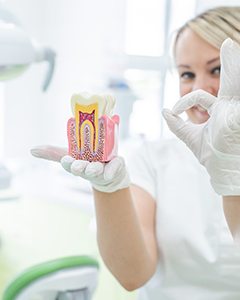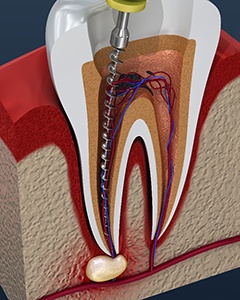Root Canal Therapy – Allentown, PA
Creating Painless Smiles With Root Canals

Are you trying to save a tooth that’s damaged or severely decayed? If so, root canal therapy may be the best solution to preserve it. That said, many people assume this treatment is uncomfortable and often hesitate to commit to the procedure. On the contrary, this process is designed to eliminate the pain of having an infected tooth. At Bradford Young, Dr. Young can perform root canal therapy in Allentown that residents will find both comfortable and crucial for preserving their smile. Keep reading to learn more or give us a call today to schedule your consultation.
Why Choose Bradford Young Family & Cosmetic Dentistry for Root Canal Therapy?
- Safe & Pain-Free Dental Procedure
- Accepts Dental Insurance & Alternative Financing
- Utilize Advanced Technology & Techniques
Do I Need Root Canal Therapy?

Root canal therapy is intended to save an infected tooth that might otherwise need to be extracted. The infection happens deep inside your tooth when bacteria that are normally kept out access your tooth’s interior via severe decay, a deep crack, or traumatic tooth injury. Aside from pain, the signs of an infected tooth include:
- A newly discolored tooth
- Swollen gums around the tooth
- Swelling on the side of your face
- Signs of infection on an x-ray
The Root Canal Process

When you come to Allentown restorative dentist, Dr. Bradford Young, for root canal therapy, one of our skilled dentists will first administer local anesthesia to the tooth and surrounding gum tissue to prevent pain during treatment. Then, we will access the pulp chamber and root canals of your infected tooth. Dr. Young will gently and completely clean out all evidence of infection and debris from the interior of your tooth. In doing so, they will also need to remove the dental pulp.
Once the tooth is cleansed, we'll disinfect the area and fill it with a biocompatible and anti-bacterial material. Called gutta-percha, this material expands to fill in the hollowed-out portion of your tooth. The access hole is covered and your tooth is given time to heal. After healing, your tooth will need to be protected with a permanent restoration, such as a dental crown. This prevents the tooth from succumbing to further damage and restores its normal form and function.
The Benefits of Getting a Root Canal

Root canals are essential and safe dental procedures that can help you avoid complications and more serious oral health problems down the road. Patients can expect to reap a few benefits by undergoing this treatment, including:
- Tooth preservation – Repairing a tooth instead of extracting it can save you the trouble, time, and money of needing to replace it with restorations.
- Practically pain-free treatment – By providing you with a local anesthetic, you’ll expect to undergo a painless procedure. Most patients claim it’s no worse than receiving a regular filling.
- Healthy pearly whites – After cleaning out all damaged or infected tissues that are causing pain, you can fully enjoy showing off a safe and comfortable smile again!
Root Canal FAQs
How Can I Avoid the Need for a Root Canal in the Future?
Root canal therapy is incredibly important to receive when you need it. However, this treatment can usually be avoided with the right oral healthcare routine. To prevent infection and decay, brush your teeth twice a day for two minutes each session. Angle your brush at 45 degrees for the most thorough cleaning. You should also floss once a day, removing harmful plaque and food debris from between your teeth. For an extra layer of cleaning, try a nonalcoholic mouthwash after you’re done brushing. Last but certainly not least, visit our office for routine checkups and cleanings to catch any issues early before they get worse.
Is There an Alternative to Getting a Root Canal?
Root canal therapy is one of the most important treatments we have to offer because the only alternative is tooth extraction. In fact, before root canals, that’s exactly what was done. If you had a tooth infection, the only way to prevent it from spreading and causing more damage was to completely extract your tooth. Thankfully, root canal therapy effectively removes damaged or infected tissue while keeping your tooth intact. That said, there are some cases where teeth are too damaged or infected for a root canal, which may result in an extraction.
Is it Painful to Get a Root Canal?
Root canal therapy often gets a bad reputation for being painful. However, we offer this treatment to get patients out of pain rather than put them in it! In reality, your procedure is much more comfortable than you may have guessed, with a sensation that is similar to a simple filling. Typically, the only discomfort and soreness you will feel occur once the procedure is over, but this will go away after a few days. Dr. Young does all he can to ensure that his patients remain relaxed and comfortable throughout their entire appointment.
What Should I Do After I Get a Root Canal?
After your root canal therapy, it’s vital to give yourself some time to rest. Many patients who plan a root canal elect to have their appointment on a Friday so they can take the weekend to relax. However, if your schedule doesn’t permit you to do so, or it’s simply an emergency, just be sure to give yourself at least a day after your treatment to recover. You can take over-the-counter pain medication and use a cold compress for any swelling. Your discomfort will go away after a few days, but if it seems to get worse, please don’t hesitate to contact our office for necessary treatment!

